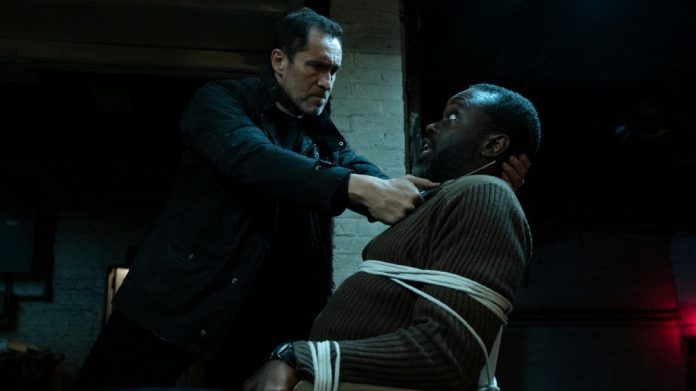Stories of vampires date back to the 18th century, beginning with gothic literature and the publication of John William Polidori‘s The Vampyre (1819), which was inspired by the life and legend of Lord Byron. Of course, the most well-known tale of the vampire is Bram Stoker‘s Dracula (1897). Over 100 years later, we’re still mesmerized by bloodsuckers who roam the night, and there are multiple reasons why we feast on films and television shows that portray them.
Demián Bichir has an interesting theory on why vampires are so beloved, and it’s not what you may think. In the new Showtime series Let the Right One In, he portrays Mark Kane, the father of 12-year-old Eleanor (Madison Taylor Baez), who is forever trapped in her adolescent body when she is turned into a vampire. Mark will do reprehensible things to feed her, but there’s no judgment here from Bichir, who was born in Mexico City and raised in a family of thespians. His mother, Maricúz Najera, and brothers Odiseo and Bruno, are also actors, while his father, Alejandro Bichir, directs theater, which is where Demián got his own start.
Bichir is a consummate actor who deftly straddles the worlds of theater, film, and television. He graced the stage at the tender age of three at the Palace of Fine Arts in Mexico City, and belonged to the National Theatre Company for seven years, performing iconic works such as Shakespeare‘s Richard III, A Midsummer Night’s Dream, and Eugene O’Neill‘s Ah! Wilderness, which marked his first starring role.
Bichir went on to score an Oscar nomination for Best Actor for his remarkable turn in the 2012 drama A Better Life, and his other feature credits include Quentin Tarantino‘s The Hateful Eight, Steven Soderbergh‘s Che, Ridley Scott‘s Alien: Covenant, and Angelina Jolie‘s upcoming film Without Blood, just to name a few. He’s also well known to TV audiences thanks to his work on Weeds, The Bridge, and Grand Hotel.
Above the Line recently spoke with Demián Bichir via Zoom from his home in Los Angeles. Wearing a sweatshirt with a New York logo and sporting a mustache (compared to his clean-shaven character in Let the Right One In), Bichir is someone who digs deep, both as an actor and as an interview subject. He talked about what initially attracted him to Let the Right One In, his chemistry with co-star Anika Noni Rose, and the intensity of the character before sharing a very interesting theory about the lure of vampire lore.
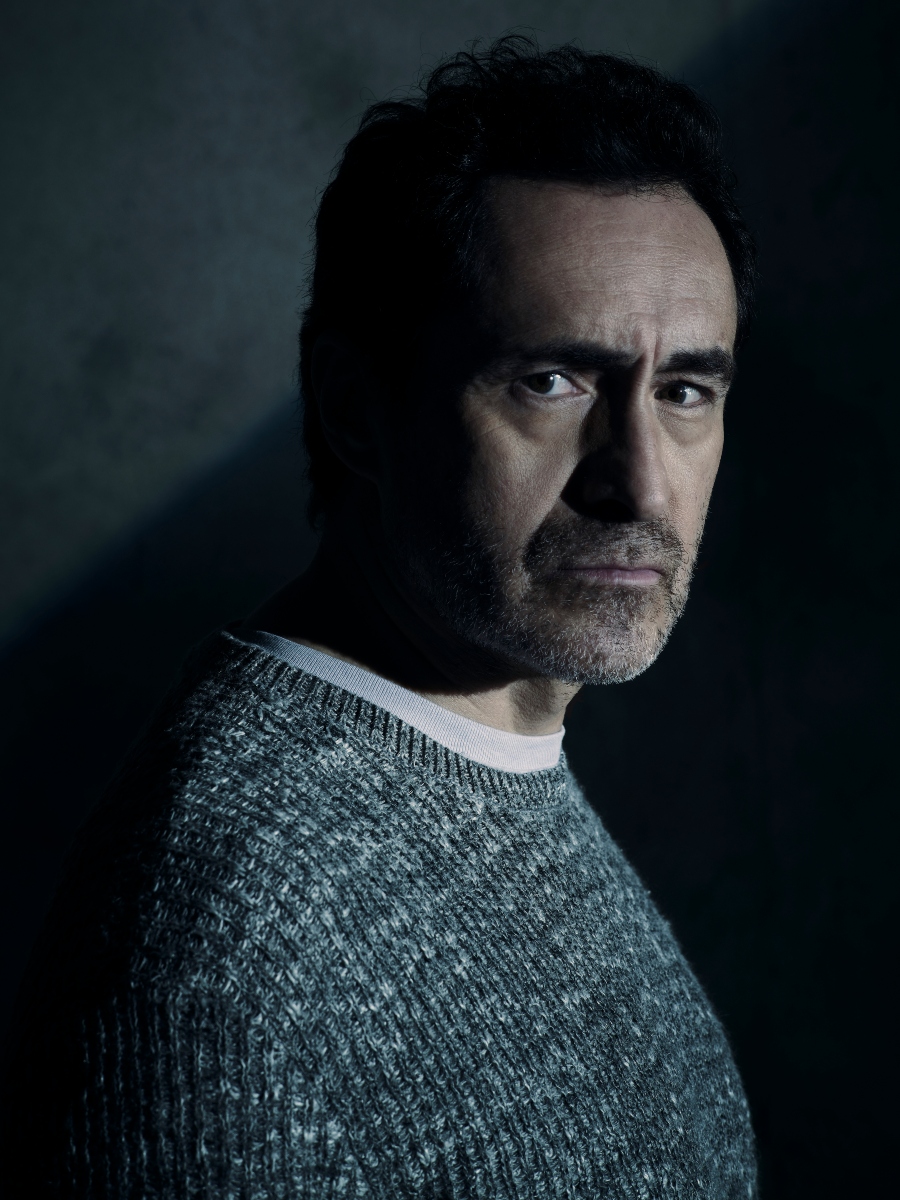
Above the Line: Did being a father in real life play a part in attracting you to this role?
Demián Bichir: As a father, I don’t really think about that when I say “yes” to a project. It’s a different set of elements that make you say “yes” to a character, and if the character happens to be a father or not, that’s like a secondary type of thing. But of course, having a daughter the same age as my daughter in the show creates some kind of a link and an emotional connection to it.
ATL: So then what made you say “yes” to Let the Right One In?
Bichir: The power of the script and my meetings with [creator] Andrew Hinderaker and Seith Mann, our director for the first three episodes. You want to make sure that whoever you team up with [is] on the same page in different ways, not only in terms of the show we are gonna do, but even the films they love or the music they listen to, or their [personal] views. And sometimes, just talking to someone, you learn a lot from that person. I just love Andrew and saw it immediately. And then, of course, reading the material, it was a very powerful story. It was a wonderful, three-dimensional character with so many layers and many different flaws and virtues.
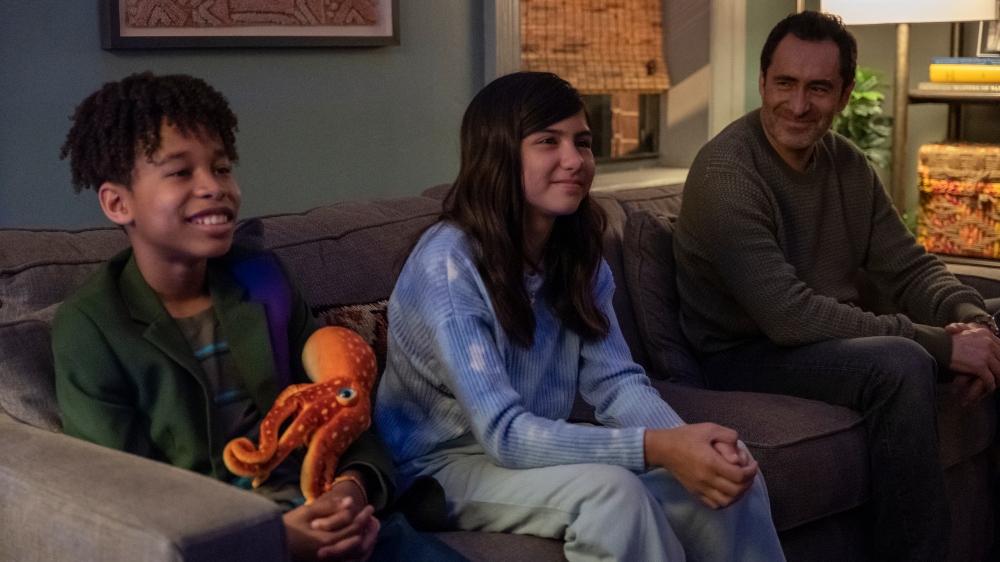
ATL: Speaking of Mark Kane’s flaws, I have to ask you about the bloodletting scenes, which I imagine were pretty tough. How did you prepare for those?
Bichir: I guess we’re trained to face any type of challenge, any type of scene, and solve any type of problem. I don’t see those scenes as a problem, necessarily. You know, this has been a very intense show emotionally, physically, and mentally. [It was] very demanding, but because of everything about it, not only the physical scenes or the bloody scenes. It’s something that demands your full concentration 24/7. And I’m saying that because even in the very [little] time [you have] off, you’re still connected. You can never really take a break because even on Sundays when you rest, you’re still there, and you can’t get distracted because it goes very, very fast. Although 5-6 months go [by] really, really quickly.
ATL: How do you concentrate when working with kids?
Bichir: It’s very difficult when you have kids on set. It’s challenging for them because it is very, very challenging for any adult, [so] you can only imagine how that is for a kid. We were so lucky to have these two talented kids, Madison [Taylor Baez] and Ian [Foreman], because they carry a lot of the weight of the show on their shoulders, and just the fact that they were always there and very professional, that made a big difference. You learn a lot from them because they remind you of the basics of acting, which is just playing and [having] fun — you know, pretend that this is real, and then fully believe in it.
ATL: One of the things your character does is work as a chef in his friend Zeke’s restaurant. I know you make a mean guacamole from your stint working at the famed Mexican restaurant Rosa Mexicano in New York. Did you learn any new culinary skills for those scenes?
Bichir: Not really, because we don’t show a full preparation of any dish like they do on the food shows [where] they go step by step and they tell you what to do and then you see the final result. But I love cooking, so I guess it [also] helped me [in my] approach [to] whatever work we did in the kitchen, [which] was pretty intense because you want everything to look real. So I guess my years backstage at the Rosa Mexicano paid off [chuckles]. I was about 22, 23.
What happened in New York was like an adventure, a small little break that I gave myself to learn something else and experience other things. [But] I grew up in the theater, which is actually my beginning. But basically, I’m an actor [forged] in the theater of Mexico, and that’s pretty much my background.
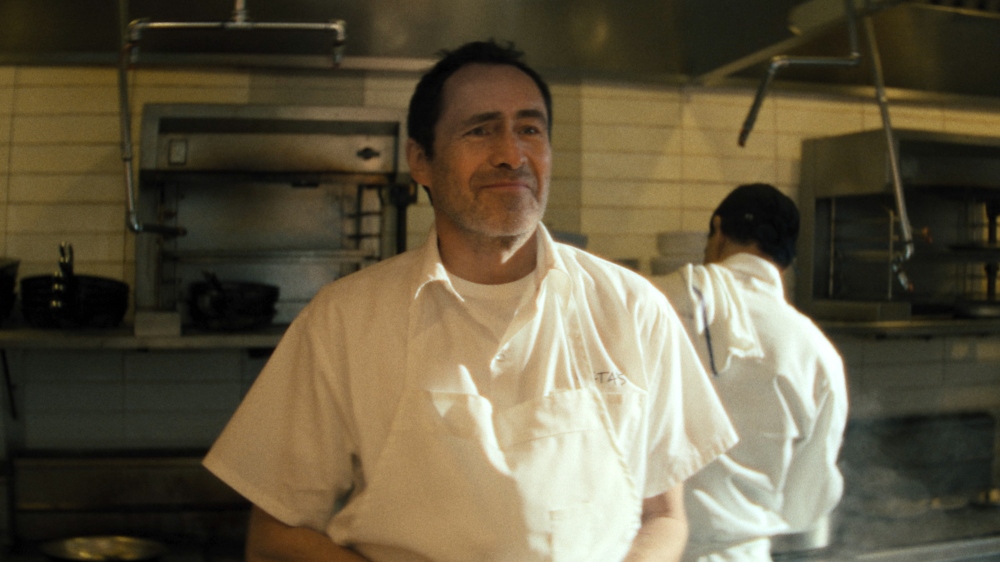
ATL: Do you agree that actors should make their bones in the theater?
Bichir: There are many, many phenomenal actors that have never, ever, gone [on] the stage. Some actors are not even interested in doing theater [and] never did it, not even school, and they’re great. Then, some other people think actors who are great in theater are not necessarily good on TV or [in] films. But it’s good training, definitely. It is beyond anything else. It’s not only beautiful, but the full experience happens in one shot, in one moment. There’s something [about the fact] that there’s no record of it later on. Nothing. None whatsoever, so whatever happens there is unique and stays there in your heart and in the minds of the audience. And [there’s] something [about how] we breathe the same air at the same time. We prepare to get to the same place as soon as we wake up that morning. So that magical communion, that encounter, to me, is probably what takes me back to the theater over and over again, because it’s a very unique experience that we all gather in the same place for us to tell you a story, and for you to be a part of [it].
ATL: Were there moments in your film and television career where it felt like theater for you?
Bichir: They’re different media — theater, TV, and films. The only time that I felt something similar to the process of theater was when [I] did The Hateful Eight with Quentin Tarantino, because he wanted that to be that way, and he told us from the beginning, ‘this will be like a theater process. We will be sitting at a table working on the dialogue only for a couple of weeks or more, and then we will begin blocking a couple of scenes here and there,’ which is very much like theater. The whole film was shot almost like a theater piece where everybody will be on set, on the stage, at all times, whether the camera was on you or not.
ATL: In Let the Right One In, can you talk about your relationship with Anika Noni Rose and the beautiful chemistry that you have together on the show?
Bichir: I’m glad you think it’s beautiful because that’s how I feel. That’s what I think. I agree with you. It’s very easy when you have such a beautiful actor with you, such a generous peer. Anika is like a natural mother, you know? She shelters you and she takes care of you and everybody, and the kids especially. She’s such a dreamy woman; it’s very easy to love her [chuckles].
I love that relationship because it seems like Mark is only interested in her because she could potentially, eventually, help him to find a cure. But you know, Mark is doomed as soon as he sees her eyes. He’s like, ‘Oh Lord, please don’t be so cute. I can’t afford that,’ because Mark has been living for his daughter for the last 10 years, and falling in love is not part of the plan.
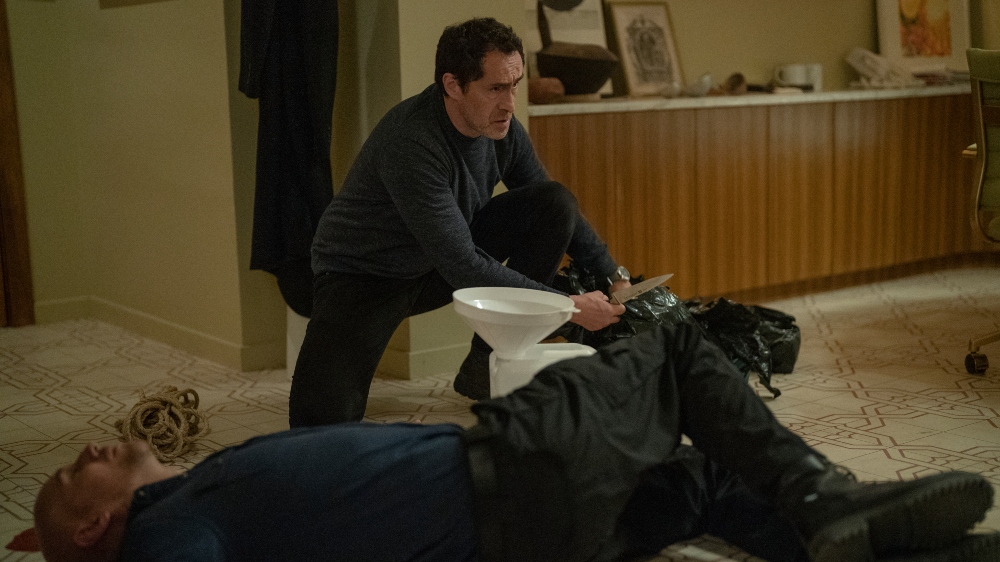
ATL: Why do you think we love vampire stories so much, and what do you think it is about the vampire lore that has helped the genre endure over the years?
Bichir: It’s been around for quite a while, right? It’s always been there, I think. We get fascinated by those creatures because as Andrew [Hinderaker] says, they are the [most] human of all the monsters. And there is, of course, the eternity aspect of it, [which] is also very sexy. It’s always related to that. It’s always something very appealing. I guess we get fascinated by it because we all could be vampires. You know, we [all] have this duality. We can be good and bad at the same time. We can be wonderful and then ‘grrrr,’ turn into something else. That alone is just fascinating. But it’s also a very interesting analogy with many aspects [of] life.
I always think about immigrants when I think about this story. I think about all the immigrants who perished in the ocean and the waters of Africa trying to get to Italy or Greece or Spain. In most of the [photos], you see a lot of images of parents holding their kids, a father holding his kid. Also, all the people who cross the border through the desert or the river into the United States, there’s a very clear link to that because that’s how the story begins. We’re running from one place to another. We’re always trying to find our ground, trying to find a place where you can be safe, [and] your children can be safe and healthy and happy, and [you can] provide them with a better life. That’s pretty much what the [vampire] story is all about.
ATL: Did you relate to that immigration theory, coming from Mexico?
Bichir: Absolutely, yes. And I don’t think it’s a casualty that the lead characters are Mexican in a place and time like the U.S. right now. And over the last crazy five years, I think it’s very clear how some people can’t see the light of the sun. Some people still live in their shadows. They still have to have a low-profile type of life.
ATL: What a great analogy. So what do you hope audiences come away with after watching this story?
Bichir: I hope people find high-quality drama and something that does not underestimate their intellect, something that challenges their own emotions. If we’re lucky, people [will] feel what we felt when we read the scripts and when we shot the series. If they get the same rush that we got, then we will be successful. This is not an average vampire story. This goes beyond all that. I hope people can feel that and they will encounter a very moving love story.
Episode 9 of Let the Right One In will air on Sunday, Dec. 4, with the Season 1 finale due on Dec. 11.


